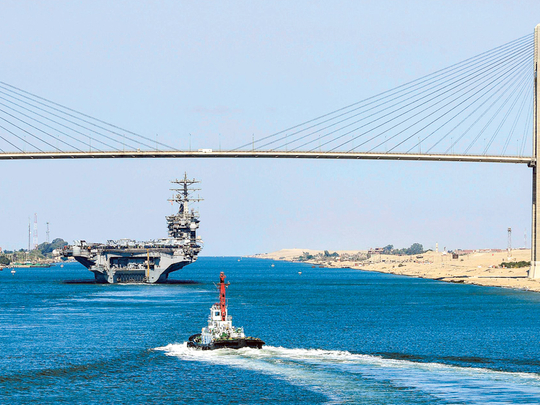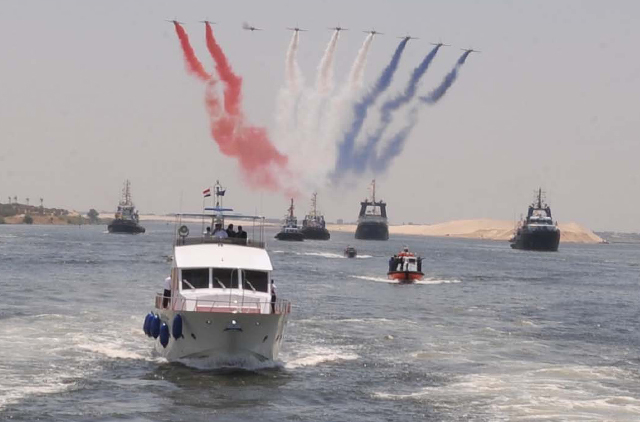
Cairo: A major development project, launched this week by Egyptian President Abdul Fattah Al Sissi in the Suez Canal area, is aimed at emphasising the country’s stability despite regional turmoil, analysts have said.
“The main political message behind this project is that Egypt is stable enough to launch such a big project,” said Abdul Moneim Al Sayyed, the head of the non-governmental Cairo Centre for Economic Studies.
Al Sissi, who took office in June, declared on Tuesday the building of a 72-long-kilometre canal alongside the existing Suez Canal that links the Mediterranean and Red seas. Al Sissi said the new canal will be completed in one year rather than the planned three years to boost traffic at the 145-year-old waterway.
The new canal is part of an ambitious project estimated to cost $8.2 billion (Dh30.1 billion) aimed at making Egypt a global trade and industrial hub.
The project is planned to include ship service facilities, and petrochemical and electronics plants to create at least one million jobs in the country, where the official unemployment rates surpass 13 per cent of the workforce.
The new waterway will be funded through public subscriptions limited to Egyptians, according to Al Sissi.
“This way of financing will revive what is called economic patriotism, which played a big role in the emergence of great Egyptian projects in the past,” Al Sayyed said.
Al Sissi, a former defence minister who led last year’s ouster of Islamist president Mohammad Mursi, said the project will be implemented by Egyptian and foreign firms under the army’s supervision.
Al Sissi’s announcement, made in a nationwide address, came a month after his government introduced dramatic hikes in fuel prices as part of a plan to cut energy subsidies and curb a ballooning budget deficit.
The Egyptian economy has been in the doldrums for the past three years mainly due to political instability that has hit the country since a popular uprising forced president Hosni Mubarak to step down in 2011. Al Sissi has pledged to re-establish security and revitalise the economy.
“The Suez Canal project signals the change of circumstances for the better in Egypt,” said Sameh Saif Al Yazal, an ex-army general. “And now that Egypt will dig a new canal, Israel’s project to dig a canal vying with the Suez Canal has become an illusion.”
In Al Yazal’s opinion, the massive project in the Suez Canal area will also boost security in the restive Sinai Peninsula by creating new jobs for its people, who long complained about marginalisation by governments on Egypt’s mainland.
Ordinary Egyptians sounded upbeat too. “This project unleashes the capabilities of Egyptians because President Al Sissi has repeatedly said that Egypt will be rebuilt only by Egyptians,” said Mokhtar Abul Fetouh, a 67-year-old pensioner.
“His words and action remind me of the eternal leader Jamal Abdul Nasser,” he added, referring to the immensely popular Egyptian leader, who ruled the country for 16 years and died in 1970. Nasser nationalised the Suez Canal in 1956, triggering the so-called Suez Crisis.
“The idea of asking Egyptians to buy shares and bonds in the new canal project is excellent because it ensures that Egyptians will reap economic benefits from the project,” said Abul Fetouh.
However, Mursi’s backers have accused Al Sissi of “plagiarising” the project from his Islamist predecessor.
“The Suez Canal development project, of which the coup authorities are now proud, was stolen from the legitimate [Mursi] government,” said Aisha, daughter of the Muslim Brotherhood leader Khayrat Al Shater.
“Where are the media people, who accused president Mursi of betraying the country and selling it to foreigners when he presented the same project?” she added on her Facebook.
Mursi, Egypt’s first democratically elected president, was accused by the mainly secular opposition of jeopardising national security by allegedly giving his staunch ally, Qatar, a major role in handling the project.
On Tuesday, Al Sissi asserted that the latest version of the project is different from Mursi’s. Al Sissi said that as a defence minister, he had objected to Mursi’s project for “national security considerations”.













